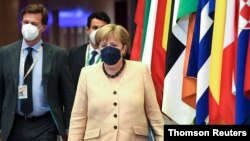On the first day of its summit in Brussels, the 27-member European Union failed to agree to terms for proposed an EU-Russia summit, and sharply debated Hungary’s new LGBT legislation.
The Russia summit, proposed by France and Germany, was opposed by most eastern European nations, which felt such face-to-face discussions would appear to be rewarding Russian President Vladimir Putin for recent aggressive actions, such as cyberattacks or amassing troops on Ukraine’s border.
Talking to reporters ahead of day two of the summit in Brussels, German Chancellor Angela Merkel expressed regret her fellow EU members could not come to an agreement on terms for such a summit, which she argued was necessary to address issues with Russia. But she said the EU members established what conditions and prerequisites must be met before a future summit could take place.
Merkel said the most important thing was for the bloc to act together, rather than individual states acting on their own.
In his comments to reporters, French President Emmanuel Macron agreed, saying that unity among member states is what’s most importance. But he also questioned why the eastern European nations did not express similar objections to U.S. President Joe Biden’s meeting with Putin earlier this month.
Both Merkel and Macron said most EU members let Hungary know their objections to the recently approved legislation banning depictions interpreted to “promote” homosexuality or gender fluidity to any person under the age of 18. Merkel said the EU members let Hungary’s prime minister, Viktor Orban, know that the legislation goes against European values.
Macron said the legislation is an example of certain European states being pulled by “models of society, political models, that are contrary to our values." He said it was important member states work through those differences.
Merkel also said she has warned member states of the rise of the delta variant of the virus that causes COVID-19. The variant spreads more quickly and can lead to more severe symptoms. She said it is on the rise in Germany and elsewhere in Europe and if left unchecked, it could stifle the recovery from the pandemic. She urged nations to step up their vaccination programs.
EU Leaders Reject Putin Summit; Defend LGBT Rights
- By VOA News





